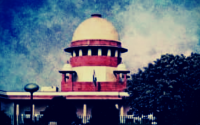Coronavirus impact: Order, order… but virtually
Source:-https://www.newindianexpress.com
BENGALURU: Coronavirus has changed our lives. And the judicial system too has been affected. Instead of filing into courtrooms, judges and advocates have been logging into Zoom. It’s a way to keep legal proceedings moving in the age of coronavirus.
Framing its own Standard Operating Procedure (SOP) for hearing cases in the high court and conducting trials in the district and taluk courts, the Karnataka High Court has been in the forefront in the effective use of technology in the country.
“Covid-19 has badly affected the High Court, with over 180 staffers testing positive, including Registrars and judicial officers, by the end of October. To reduce the footfall, there was no option but to take recourse to virtual hearing,” Chief Justice Abhay Shreeniwas Oka said in a recent judgment.
“The benefits of the video conference hearing which commenced due to Covid-19 outweigh the technical problems,” Dr Justice D Y Chandrachud, judge of Supreme Court, said while appreciating the Karnataka High Court during the launch of its e-facilities.
This new mode of dispensing judgment saw its longest hearing. “Perhaps this case must be the longest hearing conducted — 61 hours in 25 working days — through video conferencing. The record of these petitions run into more than 5,000 pages. The members of the Bar could argue while sitting in New Delhi, Chennai, Mumbai…”
This was mentioned by a division bench of Chief Justice Abhay Shreeniwas Oka and Justice Ashok S Kinagi in a 336-page judgment on October 24, in relation to a batch of petitions over winding up six mutual funds schemes by Franklin Templeton Trustee Services Private Limited.
This shows the efficient service being rendered by the staff in making virtual hearing, which was launched in the first week of April after lockdown, a big success in the state. Initially, the high court took up public interest matters suo motu considering their urgency, and eventually began hearing all cases.
A team of officers will take the names and contact numbers of advocates who have filed vakalath and ensure the link/login ID and password generated through automation reaches them daily. In the high court, access will be supplied for up to 100 advocates in each court hall.
“The virtual hearing has helped the advocates save their time and money,” said K Satish, a young advocate. There is a flip side too. Recently, the Chief Justice requested the advocates not to share the login ID and password with clients, as many joined the hearing of IMA ponzi scam cases unauthorisedly.
Clients can be accommodated by the respective advocates if needed, the Chief Justice said, after the hearing got disconnected suddenly due to over number of users. The Chief Justice has been taking measures to address the technical issues.
Court hearings online
A court-hall-wise video conference link with a passcode will be web hosted on the high court’s website, with effect from Monday. Advocates must register themselves to use it.



